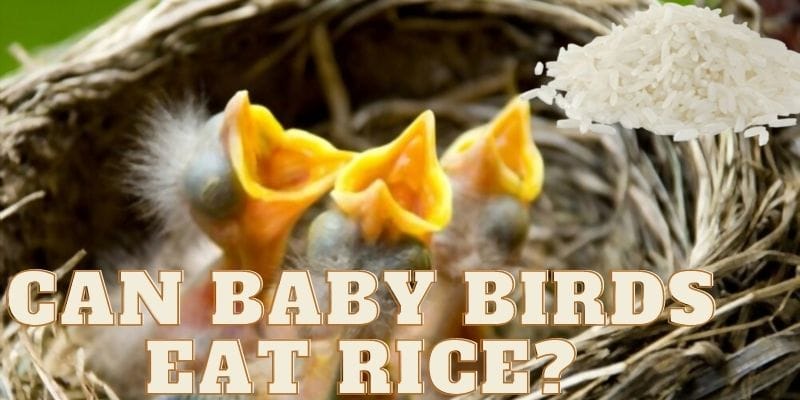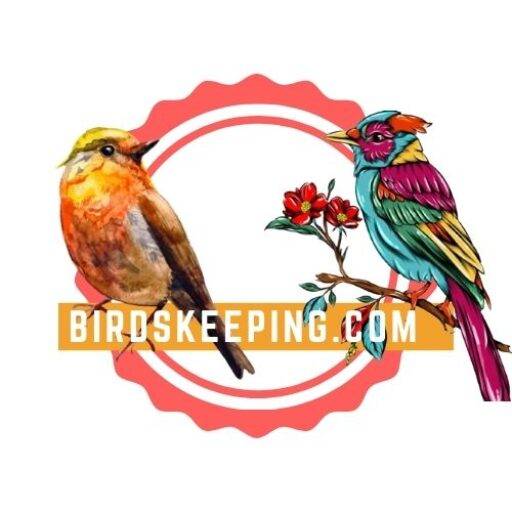Rice is one of the most discussed foods for animals and especially for birds. However, many people have doubts, and even some are afraid to feed birds rice. On the internet, many people have asked the question, can baby birds eat rice?
The straightforward answer is that baby birds can eat rice, but rice is not suitable for them, and this is because rice does not provide them with any benefits in their growth.
After reaching the stomach of baby birds, rice will make them feel full without giving any beneficial nutrients to them.
Table of Contents:
- Is Rice Safe For Baby Birds?
- Can I Feed Baby Birds Rice?
- Can Baby Birds Eat Raw Rice?
- Do Baby Birds Eat Cooked Rice?
- Can Baby Birds Eat Rice Grains?
- How To Serve Rice To Baby Birds?
- Final Words
Is Rice Safe For Baby Birds?
Birds can eat and digest rice even if they are raw because it is found that birds sometimes eat raw rice during their migration. You don’t have to be worried while feeding rice to your birds sometimes, but it is not recommended regularly.

They can easily digest them before rice causes any harm to their body. Moreover, rice is a safe food for birds, and it also contains many minerals, vitamins, and many other beneficial compounds for birds’ health.
Rice can be used as a source to get instant energy due to the high carbs in them. There are two types of starch, amylose, and amylopectin, present in rice which make up 80% of the dry weight of rice.
The starch of the type amylose takes more time to digest, which is beneficial for birds as it helps regulate blood sugar levels. The remaining 20% of rice contains fiber, protein, and a small part of fat.
The grains that have their barn intact have a higher density of nutrients than the grains that have their barns removed, as most of the nutrients are stored in the rice barn.
The same is the case for minerals and vitamins. By removing the barn, about 90% of the nutrition of rice is lost.
Enriching the rice is done by adding artificial nutrients to compensate for the amount lost, but even by performing this process, the overall concentration is less than half.
The vitamin B present in rice can help improve a bird’s ability to extract energy from food. Vitamin B also helps form and maintain cells, whereas cells are protected by the antioxidants present in vitamin E.
Can I Feed Baby Birds Rice?
Baby birds are very delicate when it comes to their diet. They need a specialized diet with insufficient nutrients for their proper growth.
Whereas rice has insufficient nutrients because rice is not a good choice as food for baby birds, and rice is not suitable for adult birds.
While in comparison to rice, we have many better options, which are far richer in nutrients than rice.
In baby birds, protein is an essential part of their diet, and insufficient protein can result in poor growth. Whereas rice has a small amount of protein that is insufficient for baby birds.
Nevertheless, if you are feeding rice to the birds with babies, there are chances that they will feed rice to their baby birds.
Can Baby Birds Eat Raw Rice?
Rice that is hard ad dry can be harmful to birds. The ecologist discovered that dry rice could absorb the moisture in the baby bird’s stomach. This condition can lead to severe conditions, and death can also occur.
Do Baby Birds Eat Cooked Rice?
Baby birds can eat cooked rice, but it never gives them the nutrition that baby birds need for their growth.
Cooked rice has almost zero nutrition, and if your baby bird is feeding on them, it will die. So, please feed your baby bird some other nutritional foods along with cooked rice.
Can Baby Birds Eat Rice Grains?
Yes, baby birds can eat rice grains. It does not matter whether rice is short or long. But, for baby birds, it is preferable to feed them small rice grains. But if you are feeding them cooked rice, you can feed them rice grains in both sizes.
How To Serve Rice To Baby Birds?
Before serving rice, you can steam them or can boil them. But never go for frying as fried rice is not good for birds. Never serve rice only, and add some bird snacks, seeds, or fruits (chopped) to make it healthy.
You can also make small rice balls and can hide chopped fruit or any other food in them. And if you want to preserve rice, then make puffed rice.
Never go for market-preserved rice as it may have chemicals that are not good for the health of baby birds.
Final Words
A collection of different materials is also found in rice. Rice’s color can distinguish the concentration of some minerals, i.e., if the color of the rice is red, it means rice is rich in zinc and iron.
The proper formation of bones and beaks is ensured by manganese, magnesium, and calcium. The mineral selenium helps fight chronic disease, which harms the organs, and iron is an essential ingredient in stabilizing the oxygen level in the blood.
Colored rice is a good source of antioxidants such as black rice and even more antioxidants than blueberries. However, there are major drawbacks of feeding baby birds rice too.
All the nutrients that are present in rice are in small quantities as compared to other feeds. Rice can also be a carrier of heavy metals depending on the area where rice is grown.
If your birds consume an excess amount of rice with high content of heavy metals such as mercury or arsenic, it can be poisonous and even fatal for them.
Even with all the benefits, rice is not good for baby birds and should not be included in their diet. No doubt, rice contains many essential nutrients, but we have better options available.
The amount of protein present in rice is insufficient in comparison to the amount needed for the proper growth of baby birds.
Baby birds can easily eat cooked rice, especially in winter. But only the birds like pigeons, pheasants, and baby doves will eat them when it comes to uncooked rice.
Birdskeeping is supported by its readers. When you purchase through links on our site, we may earn an affiliate commission. Also, as an Amazon affiliate, we earn from qualifying purchases without costing you extra.
